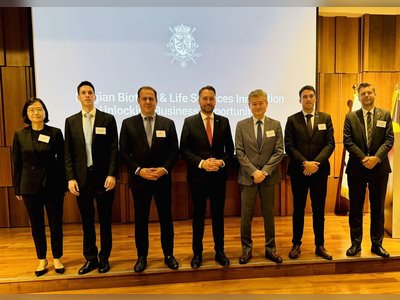Global Leaders Gather for Climate Action Summit in Paris
World leaders convene to address urgent climate challenges and reaffirm commitments under the Paris Agreement.
World leaders gathered in Paris on September 20, 2023, for a significant climate action summit aimed at intensifying global efforts to combat climate change.
The event saw participation from over 100 countries, including major emitters such as the United States, China, and the European Union, as well as representatives from the United Nations and various non-governmental organizations.
The summit was convened against a backdrop of increasing global temperatures, extreme weather events, and a series of climate reports highlighting the urgency of action.
United Nations Secretary-General António Guterres opened the conference, stressing the need for 'immediate and transformative action' to meet the goals of the Paris Agreement, which aims to limit global warming to well below 2 degrees Celsius compared to pre-industrial levels, with efforts to restrict the increase to 1.5 degrees Celsius.
During the summit, countries put forth updated national climate commitments, known as Nationally Determined Contributions (NDCs).
The United States pledged to reduce its greenhouse gas emissions by 50% by 2030 compared to 2005 levels, while the European Union reiterated its goal of achieving carbon neutrality by 2050. China announced it would aim to peak carbon emissions before 2030 and increase investments in renewable energy.
Emerging economies emphasized their need for financial support to transition to greener technologies.
A coalition of countries, including India, Brazil, and South Africa, called for greater international cooperation and climate financing to help vulnerable nations adapt to the impacts of climate change.
The summit addressed financial mechanisms, with discussions around the implementation of the $100 billion annual climate fund promised by developed nations.
Youth activists and representatives from indigenous communities also attended the summit, advocating for the inclusion of diverse voices in decision-making processes.
They highlighted the importance of local knowledge and equitable solutions in addressing climate issues.
The summit was marked by commitments from private sector leaders as well, with several multinational corporations announcing initiatives to reduce their carbon footprints.
Notable pledges included investments in sustainable technologies and commitments to achieve net-zero emissions by 2035.
As the conference concluded, the atmosphere remained charged with urgency, as key stakeholders reiterated their responsibilities in addressing the climate crisis.
The outcomes of the summit set the stage for the upcoming COP28 conference, scheduled to take place in Dubai later this year, where countries will further negotiate and refine their commitments.
The event saw participation from over 100 countries, including major emitters such as the United States, China, and the European Union, as well as representatives from the United Nations and various non-governmental organizations.
The summit was convened against a backdrop of increasing global temperatures, extreme weather events, and a series of climate reports highlighting the urgency of action.
United Nations Secretary-General António Guterres opened the conference, stressing the need for 'immediate and transformative action' to meet the goals of the Paris Agreement, which aims to limit global warming to well below 2 degrees Celsius compared to pre-industrial levels, with efforts to restrict the increase to 1.5 degrees Celsius.
During the summit, countries put forth updated national climate commitments, known as Nationally Determined Contributions (NDCs).
The United States pledged to reduce its greenhouse gas emissions by 50% by 2030 compared to 2005 levels, while the European Union reiterated its goal of achieving carbon neutrality by 2050. China announced it would aim to peak carbon emissions before 2030 and increase investments in renewable energy.
Emerging economies emphasized their need for financial support to transition to greener technologies.
A coalition of countries, including India, Brazil, and South Africa, called for greater international cooperation and climate financing to help vulnerable nations adapt to the impacts of climate change.
The summit addressed financial mechanisms, with discussions around the implementation of the $100 billion annual climate fund promised by developed nations.
Youth activists and representatives from indigenous communities also attended the summit, advocating for the inclusion of diverse voices in decision-making processes.
They highlighted the importance of local knowledge and equitable solutions in addressing climate issues.
The summit was marked by commitments from private sector leaders as well, with several multinational corporations announcing initiatives to reduce their carbon footprints.
Notable pledges included investments in sustainable technologies and commitments to achieve net-zero emissions by 2035.
As the conference concluded, the atmosphere remained charged with urgency, as key stakeholders reiterated their responsibilities in addressing the climate crisis.
The outcomes of the summit set the stage for the upcoming COP28 conference, scheduled to take place in Dubai later this year, where countries will further negotiate and refine their commitments.
AI Disclaimer: An advanced artificial intelligence (AI) system generated the content of this page on its own. This innovative technology conducts extensive research from a variety of reliable sources, performs rigorous fact-checking and verification, cleans up and balances biased or manipulated content, and presents a minimal factual summary that is just enough yet essential for you to function as an informed and educated citizen. Please keep in mind, however, that this system is an evolving technology, and as a result, the article may contain accidental inaccuracies or errors. We urge you to help us improve our site by reporting any inaccuracies you find using the "Contact Us" link at the bottom of this page. Your helpful feedback helps us improve our system and deliver more precise content. When you find an article of interest here, please look for the full and extensive coverage of this topic in traditional news sources, as they are written by professional journalists that we try to support, not replace. We appreciate your understanding and assistance.











